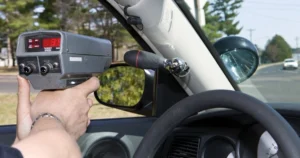Child passengers in South Bend, Indiana, are a frequently underestimated cause of distracted driving. While less obvious than cell phone use, they pose significant risks to road safety.
Table of Contents
If you were injured in a car accident by a distracted driver, our South Bend car accident attorneys may be able to help. We offer a free, no-obligation consultation and can discuss your legal options.
Call us today to schedule your free consultation: (574)-444-0741.
How Can Child Passengers Distract You?

Children in vehicles create challenges that can significantly impair road safety. Unlike well-known distractions such as texting, child passengers cause many kinds of disruptions that divert drivers’ focus from the road. Identifying child-related distractions and their driving impact is key to minimizing risks and improving road safety.
Noise and Commotion
Children can make a substantial amount of noise, which is one of the most common and disruptive forms of distraction.
Below are some of the following noises that they may make:
- Crying and Whining: Children may cry if they are hungry, uncomfortable or tired. This can distract the driver from hearing emergency vehicle sirens or honking cars.
- Shouting and Arguments: Older children or siblings may argue, shout or engage in loud conversation that could drown out other sounds. This can cause the driver to miss traffic warnings and hazards.
- Laughter and Play: While laughter and playful noises might seem harmless, they could also contribute to a chaotic environment inside the vehicle. Sudden loud laughter or play can divert a driver’s focus from the road.
Physical Movements
Younger children are naturally energetic, causing them to move around in their seats. Parents, guardians or caregivers may watch children’s movements or try to see what they are doing in the backseat. This could cause them to be distracted from the road.
These physical movements could also include:
- Reaching Out: Children may reach out to grab toys, food or even to get their parent’s attention. These behaviors can cause the driver to look away from the road or momentarily take their hands off the wheel to assist, increasing the risk of a crash.
- Shifting Positions: Children frequently shift positions in their seats. A child adjusting their seat or seeking comfort creates a movement that takes drivers’ attention off the road.
- Dropping Items: Children often drop toys or snacks and call for help retrieving them. When drivers turn their attention to assist, their focus shifts away from the road, reducing their ability to react to changing road conditions.
Requests and Demands
Children often have specific needs or requests during car trips, such as:
- Asking for Snacks or Drinks: Children may frequently request snacks or drinks, causing the driver to reach into the backseat or hand over items while driving. This shift in focus from the road to the child’s needs creates a dangerous distraction.
- Entertainment Needs: Parents often provide entertainment, like setting up a tablet or handing over toys, to keep children occupied. Attending to these needs while driving can significantly draw away attention from the road.
- Comfort and Safety: Children might complain about being too hot or cold, needing adjustments to their seat, or wanting to stop for a break. Addressing these requests while driving can result in momentary lapses in attention and decreased driving focus.
Emotional Stress
Driving with children can also introduce emotional distractions. These emotional distractions can lead to poor judgment or overly cautious driving. Parents may experience stress or anxiety related to:
- Behaviour Management: While driving, parents may have to deal with a child’s tantrums, crying or behavioural issues. Responding to these issues often increases stress levels, which could increase the chance of a car crash.
- Safety Concerns: Parents may worry about their child’s safety or comfort, which can affect their overall driving performance. For example, if a child appears uncomfortable or distressed, the driver might become more cautious or hesitant, potentially impacting their ability to drive effectively.
- Parental Guilt or Anxiety: Parents may feel guilty or anxious about their child’s experience during the trip, which can distract them from focusing on driving. This emotional strain can lead to impaired decision-making and reaction times.
Visual Distractions
Children’s actions can create visual distractions that divert a driver’s attention from the road. Common visual distractions include:
- Glancing in the Rearview Mirror: Drivers often glance in the rearview mirror to monitor a child’s behaviour or check their safety seat. These frequent glimpses can diminish their focus on the road ahead and hinder their ability to spot potential hazards.
- Adjusting the Car Seat: Adjusting or checking a child’s car seat or safety harness requires visual attention, which can distract from monitoring traffic conditions and changes in the driving environment.
How Can Drivers Prevent Child Distractions While Behind the Wheel?
Car crashes can happen at the most unexpected times. However, drivers who recognize potential distractions and implement habits to manage them can enhance their focus and help to make roadways safer.
Drivers can take these steps to prevent child distractions:
- Prepare Ahead of Time: Ensure that children have all necessary items before starting the trip, including snacks, drinks and entertainment. This can minimize the need for frequent stops or requests.
- Use Restraints Properly: Properly install and use car seats and booster seats to limit movement and reduce physical distractions.
- Provide Engaging Activities: Offer age-appropriate activities or entertainment to keep children occupied and reduce noise and commotion.
- Establish Rules: Set clear expectations with children about behaviour during the trip and discuss the importance of minimizing distractions.
Involved in a Distracted Driving Car Accident? Contact Our South Bend Legal Team Today
If you have been involved in a car accident where distractions from child passengers played a role, seek legal assistance from a licensed attorney to help you with your case. Our team at Pfeifer, Morgan and Stesiak can help you understand how to navigate through the legal process.
We are committed to helping our clients secure the compensation they deserve and have a proven track record of securing millions for our clients. Your initial consultation is free, and we do not charge fees unless we help you win the case.
We are here to help. Call us today at (574) 444-0741.













